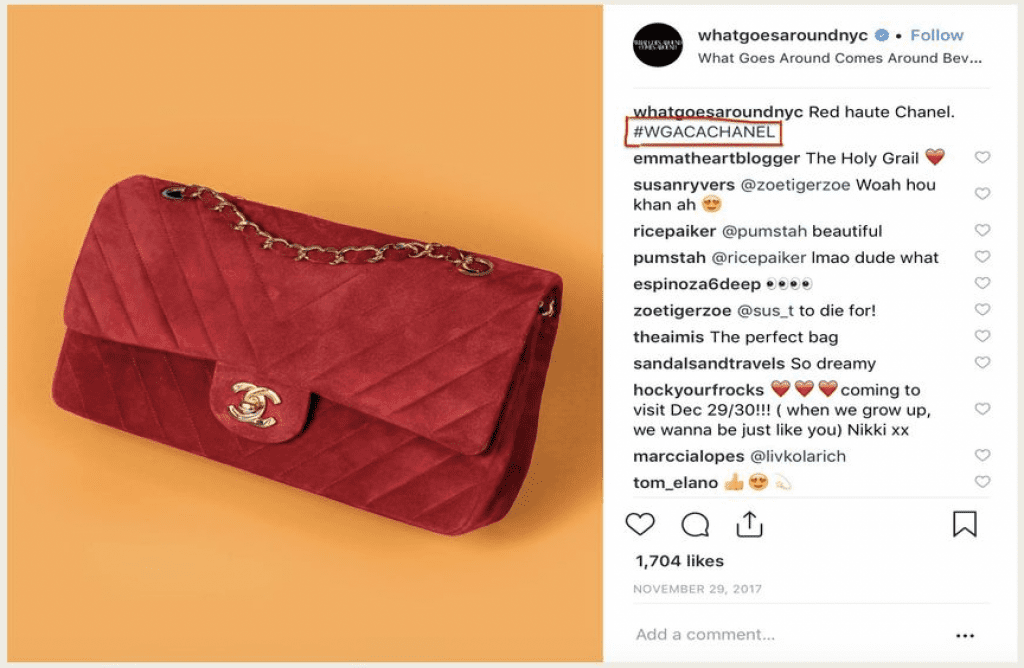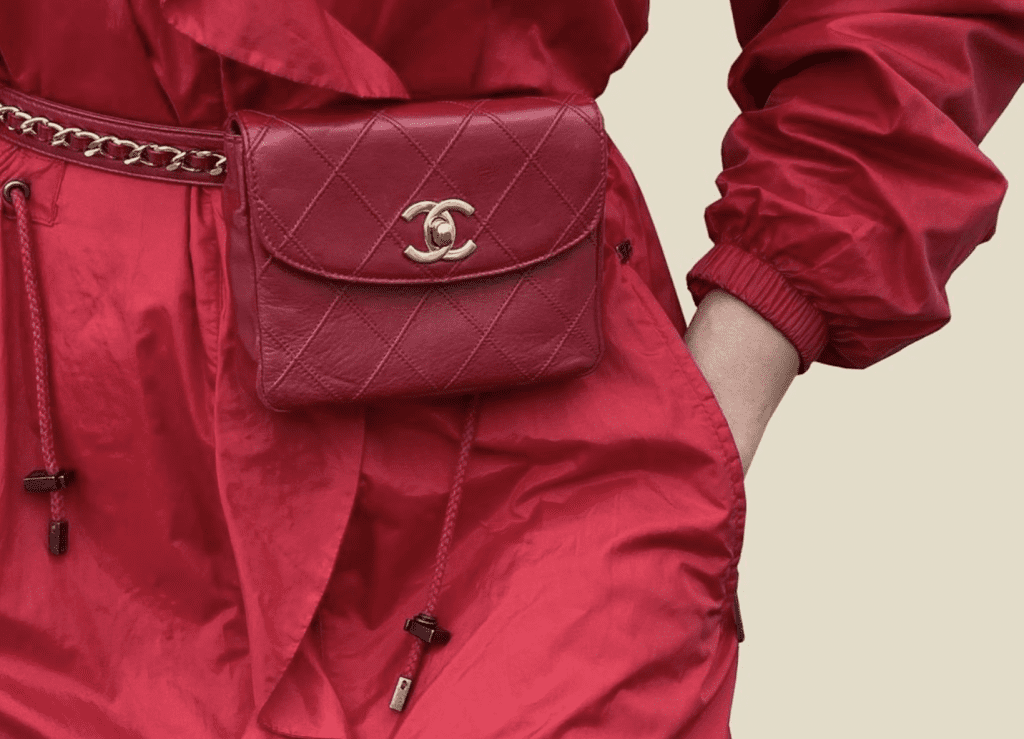A New York federal court has partially sided with Chanel in its ongoing trademark battle against a resale company. The luxury goods brand has been seeking partial summary judgment against What Goes Around Comes Around (“WGACA”) for trademark infringement and false association in connection with its advertising and sale of Chanel-branded goods that allegedly “violate Chanel’s trademarks and improperly trade off [its] brand in order to create the false perception that WGACA is affiliated with Chanel,” while WGACA moved for summary judgment on all of Chanel’s claims on the basis that its use of Chanel’s marks in advertising constitutes nominative fair use.
In an Opinion & Order dated March 28, Judge Louis Stanton of the U.S District Court for the Southern District of New York denied the bulk of WGACA’s motion for summary judgment, agreeing only to dismiss the New York Business Law claims waged against it by Chanel. At the same time, the court sided with Chanel to an extent, partially granting its motion for summary judgment in terms of WGACA’s liability for the sale of “non-genuine CHANEL-branded point-of-sale items,” an array of “non-genuine CHANEL-branded handbags with serial numbers that were stolen from [a Chanel supplier] factory, and one [otherwise] counterfeit handbag.”
Setting the stage in a 55-page opinion, the court states that Chanel filed suit against WGACA in March 2018, alleging that the New York-based reseller sold “non-genuine, infringing Chanel products, and improperly used Chanel marks in its advertising and marketing.” Specifically, Chanel’s claims for trademark infringement and false association are based on WGACA’s sale of four categories of goods: (1) nearly a dozen “non-genuine and counterfeit” CHANEL-branded handbags bearing serial numbers that were allegedly stolen from a Chanel supplier factory” in Italy; (2) two “non-genuine and counterfeit” CHANEL-branded handbags that do not match Chanel’s recorded characteristics for the bags associated with those serial numbers; (3) 50 “non-genuine” CHANEL-branded handbags that bear serial numbers that were voided by Chanel during inventory audits at its factories; and (4) 779 “non-genuine” point-of-sale items bearing Chanel logos that “were never authorized for sale by Chanel.”

Additional claims for false advertising, false association, and trademark infringement lodged by Chanel center on WGACA’s advertising practices, including its use of retail displays that prominently feature Chanel trademarks; email advertisements that “prominently display the Chanel marks;” its use of the #WGACACHANEL hashtag in social media posts; and advertising, such as “ads for general WGACA sales” that “prominently featured CHANEL-branded items.”
WGACA’s Advertising & Nominative Fair Use
First addressing Chanel’s claims that WGACA’ s use of Chanel trademarks in its advertising channels amounts to trademark infringement and WGACA’s arguments to the contrary, Judge Stanton denied both parties’ motions for summary judgement, stating that while likelihood of confusion is a question of law to be determined by the court, issues of material fact are at play here. These issues – which include “market proximity and competitiveness” of the two parties’ products, evidence of actual consumer confusion (Chanel alleges, and WGACA disputes, that WGACA’s advertising practices caused actual confusion among consumers in the marketplace), and whether there is bad faith on the part of WGACA in making use of the Chanel marks – must be determined by a jury.
On the nominative fair use front, which WGACA cites as a defense to Chanel’s trademark claims, the court states that neither of the parties has put forth evidence about whether the products being offered up by WGACA are (or are not) “readily identifiable without use of the [Chanel] marks.” Even so, Judge Stanton states that “courts in this district,” including the court in Chanel v. The RealReal, “have found this factor ‘is satisfied’ when, like here, the ‘marks used and goods sold by the defendant are indeed the same as the plaintiff’s marks and goods.” As such, “This factor cuts against a finding of consumer confusion about the source of the product and facilitates affiliation and endorsement.”
Even so, Judge Stanton determined that there is a genuine issue about whether WGACA’s use of the Chanel marks exceeds what is necessary to identify Chanel products. Chanel argues that WGACA’s use goes beyond what is permissible, i.e., “only so much of the plaintiff’s mark [is used] as is necessary to identify the product or service.” For instance, Chanel claims that “WGACA’s welcome email to customers and Facebook cover photo features the Chanel marks; its social media uses #WGACACHANEL and also features Chanel marks and indicia; [and so] do its retail displays, and its direct-to-consumer advertisements, one of which featured the Chanel mark more prominently than WGACA’s and in the WGACA stylized font.”
The court notes that “WGACA disputes Chanel’s characterization that its use of the Chanel marks is either more prominent than that of any other brand or done independent of any specific Chanel product.”
WGACA’s Sale Chanel-Branded Items
The court similarly determines that summary judgment is not appropriate for Chanel’s claim that WGACA is on the hook for infringement in connection with its sale of Chanel-branded items given that issues like “whether Chanel authorized the initial sale of the bags” are in dispute. Pointing to the “conflicting factual record” when it comes to the 50 allegedly “non-genuine CHANEL-branded handbags that bear serial numbers that were voided [by Chanel] during inventory audits at [its] factories,” for instance, the court states that “it cannot be determined as a matter of law whether the bags were non-genuine because they allegedly never passed through Chanel’s quality procedures and were not authorized for sale.” As such, the issues must be tried, and Chanel’s and WGACA’s motions are both accordingly denied.
Turning to the “point of sale items” (i.e., those used in displays in Chanel boutiques), the court sides with Chanel, stating that while WGACA argues that the point-of-sale items bearing the Chanel logo “are genuine because they were authorized for manufacture and meet the standards that Chanel set up for those items,” it offers “no evidence that Chanel authorized the initial sale of these goods.” On the other hand, Chanel provides evidence by way of declarations, retailer agreements, and its internal boutique policy, which “demonstrate that Chanel’s Point-of-Sale items are not products or for sale.” As such, Chanel’s motion for partial summary judgment of infringement is thus granted as to this claim.
In terms of the eleven bags with serial numbers that were allegedly stolen from Chanel’s Renato Corti factory, Chanel asserts the bags were either not genuine because they were not put through its quality control processes and not authorized for initial sale by Chanel, or “counterfeit” because the bags were not made by Chanel’s authorized factories. Because WGACA does not put forward “any evidence that creates a genuine dispute as to whether bags with these serial numbers went through Chanel’s quality control procedures or were ever initially sold by Chanel,” the court granted motion for summary judgment on the “narrow grounds that WGACA infringed Chanel’s marks by selling eleven non-genuine bags.”
As for Chanel’s claim of counterfeiting for those same 11 bags, the court funds that “based on the evidence offered by the parties,” including internal product information from Chanel, which shows that no bags with these serial numbers were ever produced,” and WGACA’s argument that the bags “could have stolen serial numbers and still have been made in Chanel factories,” the court states that a reasonable jury “could find either way as to whether the bags were manufactured by Chanel (thus genuine and not counterfeit) or elsewhere (and thus infringing counterfeits).” Accordingly, both parties’ motions are denied as to counterfeiting.
Chanel asserts that two handbags sold by WGACA were non-genuine and counterfeit because, according to its records, the characteristics of bags with those serial numbers were different from the characteristics of the bags WGACA sold. The court granted partial summary judgment on Chanel’s claim of trademark infringement, finding that the characteristics of one of the bags “differ[s] materially from the product authorized by the trademark holder for sale.” The bag sold by WGACA was a “Chanel Clear Vinyl Boy 9” whereas Chanel’s system listed it as a Chanel red leather bowling bag.
False Advertising & Chanel’s State Law Claims
Still yet, WGACA moves for summary judgment to get Chanel’s claim for false advertising for failing to adequately allege injury dismissed. “As it is undisputed that Chanel and WGACA are not direct competitors, the presumption of injury will not apply,” per Judge Stanton. However, the court found that Chanel has created “a genuine issue of material fact as to whether it suffered reputational injury due to WGACA’s false advertisement of counterfeit, infringing, and repaired CHANEL- branded products as genuine and unaltered and its false advertisement of CHANEL-branded point of sale items as genuine products originally made and sold by Chanel.”
Specifically, the court states that Chanel offers the testimony of Joyce Green, Chanel’s General Manager of Fashion, who stated that “WGACA’s false advertisements cause reputational harm to Chanel due to the risk that a consumer buys a CHANEL-branded item from WGACA and “has an experience … with a quality of product that is not up to the standard of Chanel,’ which damages what that customer (who could be a current or potential future Chanel customer) thinks of Chanel and its products.”
As such, the issue will be left for the jury to decide, and accordingly, WGACA’s motion for summary judgment dismissing the false advertising claim has been denied.
In a win for WGACA, the court granted its motion to dismiss Chanel’s final two claims for deceptive business practices under the New York General Business Law. According to the court’s opinion, “Chanel has not demonstrated that this dispute involves injury to the public interest over and above ordinary trademark infringement,” having offered “no evidence of injury beyond that suffered by Chanel and a select group of individuals who end up purchasing a counterfeit product.” Accordingly, WGACA’s motion is granted dismissing the state law claims. And in a final finding in favor of Chanel, the court dismissed all of WGACA’s affirmative defenses.
The case is Chanel, Inc. v. What Goes Around Comes Around, LLC, et al., 1:18-cv-02253 (SDNY).











